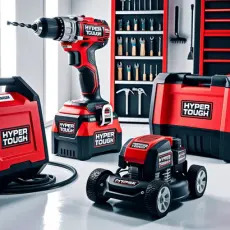Maintaining a well-manicured lawn requires the right tools, and one of the most essential devices for achieving clean edges and trimming overgrown grass is a weed eater. While traditional gas-powered models have long been the preferred choice, advancements in battery technology have made cordless weed eaters a viable alternative. But are battery-powered trimmers truly worth it? This article explores the pros and cons of cordless weed eaters, highlights key features to consider, and takes a closer look at the Hyper Tough Weed Eater, a popular option in the market.
Advantages of Cordless Weed Eaters
Cordless weed eaters have gained popularity in recent years due to their convenience and environmental benefits. Here are some of the key advantages of using a battery-powered trimmer:
1. Ease of Use and Maneuverability
One of the biggest advantages of cordless weed eaters is their ease of use. Unlike gas-powered models, which require fueling and frequent maintenance, battery-powered weed eaters start with the simple push of a button. Additionally, they are lighter and easier to maneuver, making them an ideal choice for homeowners who need to trim around tight spaces and delicate landscaping features.
2. Environmentally Friendly
Battery-powered trimmers produce zero emissions, making them an environmentally friendly option. Gas-powered weed eaters release harmful pollutants into the air, contributing to air pollution and environmental degradation. With a cordless model, users can maintain their lawns while reducing their carbon footprint.
3. Reduced Noise Levels
Noise pollution is a common concern with outdoor power equipment. Gas-powered weed eaters are notoriously loud, often exceeding safe noise levels. In contrast, battery-powered models operate much more quietly, making them a preferred choice for residential areas where noise restrictions may be in place.
4. Lower Maintenance Requirements
Cordless weed eaters require significantly less maintenance compared to their gas counterparts. There is no need to deal with fuel mixing, spark plug replacements, or engine maintenance. This makes battery-powered trimmers a cost-effective and hassle-free solution in the long run.
Disadvantages of Cordless Weed Eaters
Despite their many advantages, battery-powered trimmers do have some drawbacks that users should consider before making a purchase.
1. Limited Battery Life
One of the primary concerns with cordless weed eaters is battery life. Most battery-powered models can operate for 30 to 60 minutes on a single charge, which may not be sufficient for larger yards. Users may need to invest in additional batteries or plan their trimming tasks strategically to avoid interruptions.
2. Power Limitations
While cordless weed eaters have improved in power over the years, they still lag behind gas-powered models when it comes to tackling thick weeds and dense brush. Homeowners with heavy-duty trimming needs may find that battery-powered models lack the cutting power required for demanding tasks.
3. Higher Initial Cost
Cordless weed eaters often come with a higher upfront cost, especially when factoring in the price of additional batteries. However, the long-term savings on fuel and maintenance can offset this initial investment.
The Hyper Tough Weed Eater: A Reliable Cordless Option
For those considering a battery-powered trimmer, the Hyper Tough Weed Eater is a noteworthy option. Designed for residential use, this model offers a balance of affordability, performance, and ease of use.
Key Features of the Hyper Tough Weed Eater
- Lightweight and Ergonomic Design: The Hyper Tough cordless weed eater is designed to be easy to handle, reducing user fatigue during extended trimming sessions.
- Adjustable Shaft: Many Hyper Tough models come with an adjustable shaft, allowing users to customize the height for improved comfort and control.
- Battery Efficiency: This trimmer features a rechargeable lithium-ion battery, offering decent runtime for small to medium-sized yards.
- Automatic Line Feed: The Hyper Tough Weed Eater includes an automatic line feed system, eliminating the need for manual adjustments and making trimming more efficient.
Performance and Suitability
The Hyper Tough Weed Eater is best suited for light to moderate trimming tasks, such as edging along sidewalks and driveways or maintaining garden borders. While it may not be the most powerful cordless option on the market, it provides reliable performance for homeowners looking for an affordable and user-friendly alternative to gas-powered models.
Are Cordless Weed Eaters Worth It?
Whether a battery-powered weed eater is worth it depends on the specific needs of the user. For homeowners with small to medium-sized lawns, cordless trimmers offer the convenience, ease of use, and environmental benefits that make them a worthwhile investment. The lack of emissions, reduced noise, and minimal maintenance requirements make them an attractive option for those who prioritize sustainability and ease of operation.
However, for users who require heavy-duty trimming capabilities or have large properties, the limitations of battery life and power may make a gas-powered model a more practical choice. In such cases, investing in additional batteries or opting for a higher-end cordless model with greater power output may be necessary.
Final Thoughts
Cordless weed eaters have come a long way in terms of performance and efficiency, making them a strong contender in the lawn care industry. While they may not entirely replace gas-powered models for all users, they offer a viable and convenient solution for residential lawn maintenance. The Hyper Tough Weed Eater, with its affordability and ease of use, serves as an excellent choice for those looking to transition to battery-powered trimming without breaking the bank.
Ultimately, choosing the right weed eater comes down to personal preferences, lawn size, and trimming needs. By weighing the pros and cons and considering models like the Hyper Tough Weed Eater, homeowners can make an informed decision and invest in a trimmer that best suits their landscaping requirements.















